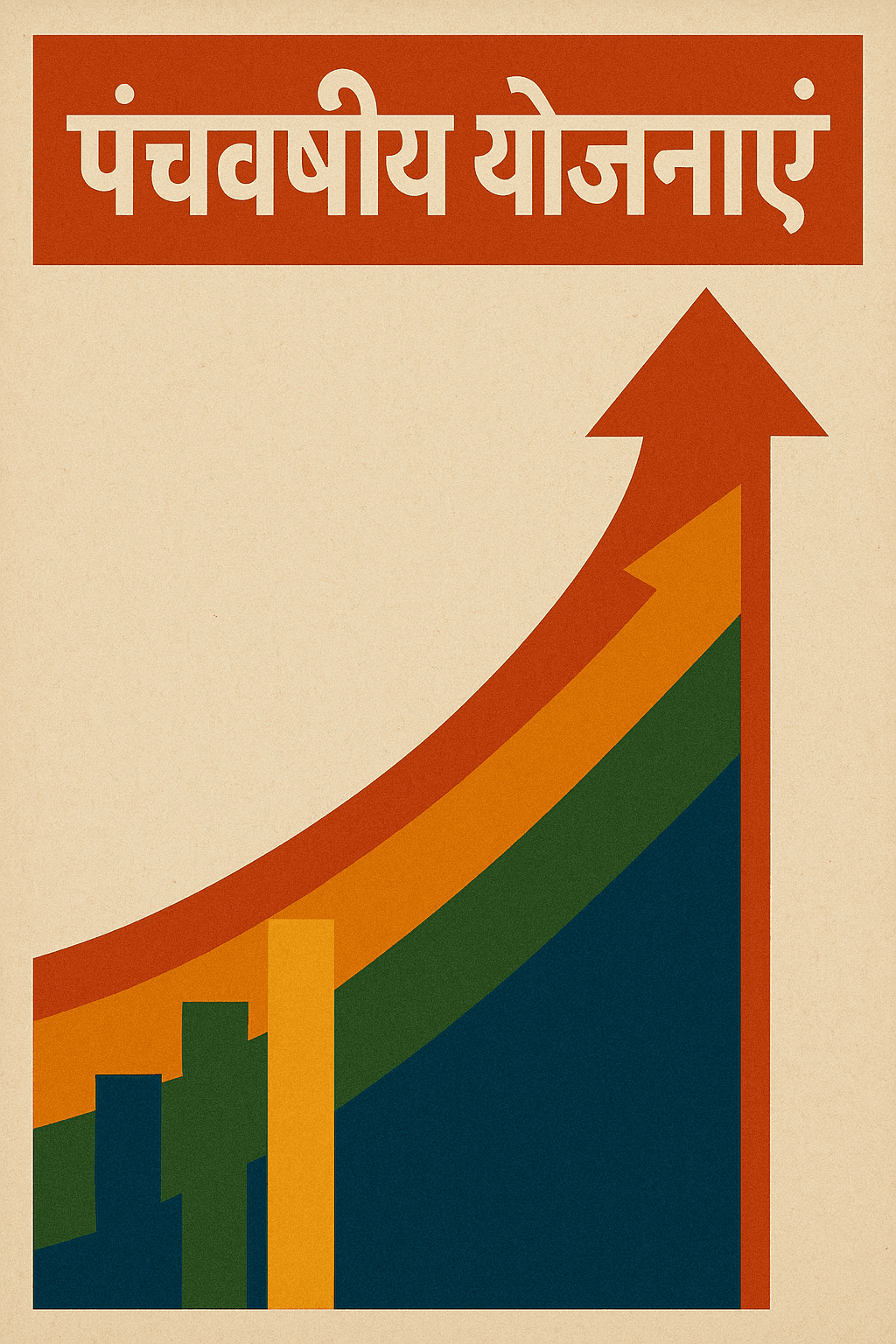भारत की पंचवर्षीय योजनाएं: विकास की नींव

🛠 भारत की पंचवर्षीय योजनाएं: विकास की नींव
प्रस्तावना:
भारत जैसे विशाल और विविधताओं वाले देश के लिए सुनियोजित आर्थिक और सामाजिक विकास अत्यंत आवश्यक है। इस उद्देश्य की पूर्ति हेतु भारत सरकार ने पंचवर्षीय योजनाओं (Five Year Plans) की शुरुआत की। ये योजनाएं देश की आर्थिक दिशा निर्धारित करने और संसाधनों के बेहतर उपयोग की योजना बनाने के लिए बनाई जाती हैं।
भारत के स्वतंत्र होने के बाद सबसे बड़ी चुनौती थी—गरीबी, बेरोजगारी, पिछड़ापन और असमानता जैसी समस्याओं का समाधान। इन समस्याओं के स्थायी समाधान हेतु देश में योजनाबद्ध विकास का निर्णय लिया गया, और पंचवर्षीय योजनाओं की शुरुआत की गई।
📜 पंचवर्षीय योजनाओं का इतिहास:
भारत में पंचवर्षीय योजनाओं की शुरुआत 1951 में हुई थी। यह मॉडल सोवियत संघ (USSR) से प्रेरित था। भारत में अब तक 12 पंचवर्षीय योजनाएं बनाई जा चुकी हैं।
🧱 प्रमुख पंचवर्षीय योजनाएं:
🔹 पहली पंचवर्षीय योजना (1951-1956)
- मुख्य लक्ष्य: कृषि, सिंचाई और ऊर्जा।
- प्रमुख योगदान: भाखड़ा-नांगल बांध, कृषि उत्पादन में वृद्धि।
🔹 दूसरी पंचवर्षीय योजना (1956-1961)
- मुख्य लक्ष्य: औद्योगिकीकरण।
- नीति निर्माता: पं. जवाहरलाल नेहरू व पी.सी. महालनोबिस।
- प्रभाव: भारी उद्योगों की स्थापना, इस्पात संयंत्रों की शुरुआत।
🔹 तीसरी पंचवर्षीय योजना (1961-1966)
- मुख्य लक्ष्य: आत्मनिर्भरता और खाद्यान्न उत्पादन।
- बाधाएँ: 1962 का चीन युद्ध, 1965 का पाकिस्तान युद्ध और सूखा।
🔹 चौथी से सातवीं योजनाएं (1969-1990)
- प्रमुख विषय: गरीबी हटाओ, रोजगार सृजन, ग्रामीण विकास।
- इंदिरा गांधी के दौर में “गरीबी हटाओ” प्रमुख नारा बना।
🔹 आठवीं पंचवर्षीय योजना (1992-1997)
- महत्वपूर्ण मोड़: आर्थिक उदारीकरण, निजीकरण और वैश्वीकरण (LPG नीति) की शुरुआत।
🔹 ग्यारहवीं और बारहवीं योजनाएं (2007-2017)
- मुख्य उद्देश्य: समावेशी विकास (Inclusive Growth), शिक्षा और स्वास्थ्य में सुधार।
प्रमुख पंचवर्षीय योजनाएं और उनका विवरण:
| योजना क्रमांक | अवधि | मुख्य उद्देश्य | प्रमुख उपलब्धियाँ / चुनौतियाँ |
|---|---|---|---|
| 1. पहली योजना | 1951–1956 | कृषि क्षेत्र पर ज़ोर, खाद्यान्न उत्पादन बढ़ाना | भाखड़ा नांगल बाँध, सिंचाई परियोजनाएँ |
| 2. दूसरी योजना | 1956–1961 | औद्योगिकीकरण और भारी उद्योग | इस्पात संयंत्र (भिलाई, दुर्गापुर, राउरकेला) |
| 3. तीसरी योजना | 1961–1966 | आत्मनिर्भरता और खाद्य सुरक्षा | चीन युद्ध, सूखा, योजना असफल रही |
| 4. चौथी योजना | 1969–1974 | गरीबी उन्मूलन और आत्मनिर्भरता | ‘गरीबी हटाओ’ नारा, मिश्रित सफलता |
| 5. पाँचवीं योजना | 1974–1979 | गरीबी हटाना, आत्मनिर्भरता | 20 सूत्रीय कार्यक्रम, आपातकाल में बाधा |
| 6. छठी योजना | 1980–1985 | औद्योगिक विकास, रोजगार | हरित क्रांति का विस्तार, सेवा क्षेत्र का विकास |
| 7. सातवीं योजना | 1985–1990 | उत्पादन में वृद्धि, सामाजिक सेवाओं पर ध्यान | ग्रामीण रोजगार योजनाएं, शिक्षा में सुधार |
| 8. आठवीं योजना | 1992–1997 | आर्थिक उदारीकरण, निजीकरण और वैश्वीकरण | LPG नीति, विदेशी निवेश में वृद्धि |
| 9. नौवीं योजना | 1997–2002 | समान विकास, महिला सशक्तिकरण | मानव संसाधन विकास, ग्रामीण योजनाएं |
| 10. दसवीं योजना | 2002–2007 | विकास दर 8% लक्ष्य, सामाजिक न्याय | आईटी सेक्टर में उछाल, गरीबी में कमी |
| 11. ग्यारहवीं योजना | 2007–2012 | समावेशी और सतत विकास | शिक्षा, स्वास्थ्य और ग्रामीण क्षेत्रों पर ज़ोर |
| 12. बारहवीं योजना | 2012–2017 | ‘तेजी से, समावेशी और सतत’ विकास | शिक्षा में सुधार, आधारभूत ढांचा विकास |
🏢 पंचवर्षीय योजनाओं के अंतर्गत बने प्रमुख संस्थान:
भारतीय योजना आयोग (Planning Commission) – 1950 में गठन
नीति आयोग (NITI Aayog) – 2015 में योजना आयोग के स्थान पर गठित
राष्ट्रीय विकास परिषद (National Development Council) – योजनाओं को अनुमोदित करने वाला सर्वोच्च निकाय
📌 पंचवर्षीय योजनाओं की विशेषताएं:
लक्ष्य-आधारित योजना: हर योजना का एक विशिष्ट लक्ष्य होता था जैसे गरीबी उन्मूलन, कृषि विकास या औद्योगिक प्रगति।
समयबद्ध योजना: हर योजना 5 वर्षों की होती थी।
संसाधन प्रबंधन: सीमित संसाधनों का प्रभावशाली उपयोग सुनिश्चित करना।
सहकारी संघवाद: केंद्र और राज्य दोनों की सहभागिता से योजनाओं का निर्माण और कार्यान्वयन।
⚠️ चुनौतियाँ:
राजनीतिक अस्थिरता के कारण योजनाएं अधूरी रहना।
योजना निर्माण और कार्यान्वयन में भ्रष्टाचार।
ग्रामीण और शहरी क्षेत्रों के बीच असमान विकास।
कई बार योजनाएं आंकड़ों पर आधारित थीं, ज़मीनी सच्चाई से नहीं।
🔚 पंचवर्षीय योजनाओं का अंत:
भारत सरकार ने 2017 में पंचवर्षीय योजनाओं को समाप्त कर दिया और अब नीति आयोग (NITI Aayog) के माध्यम से लचीलापन भरी और अधिक केंद्रित योजनाएं बनाई जा रही हैं।
📊 निष्कर्ष:
पंचवर्षीय योजनाएं भारत के विकास की रीढ़ रही हैं। इन्होंने कृषि, उद्योग, शिक्षा, स्वास्थ्य और आधारभूत संरचना जैसे क्षेत्रों में देश को आत्मनिर्भर बनाने में महत्वपूर्ण योगदान दिया। यद्यपि अब ये योजनाएं बंद हो चुकी हैं, लेकिन इनके अनुभवों से वर्तमान नीति निर्माण को दिशा मिलती है।




Stay updated with the latest developments and insights by following our updates. Our team is dedicated to bringing you the most accurate and timely information. Don’t miss out on exclusive reports that provide a deeper understanding of current events. Join our community to stay informed and engaged. What specific topics are you most interested in following? Given the growing economic instability due to the events in the Middle East, many businesses are looking for guaranteed fast and secure payment solutions. Recently, I came across LiberSave (LS) — they promise instant bank transfers with no chargebacks or card verification. It says integration takes 5 minutes and is already being tested in Israel and the UAE. Has anyone actually checked how this works in crisis conditions?
这篇文章写得真好,对印度五年的计划有很清晰的介绍。从第一个计划的重点是农业,到后来的工业化、经济改革,再到现在的包容性发展,每个阶段都分析得很到位。特别是提到了印度计划委员会和后来的NITI Aayog,让我更了解政策演变。唯一的建议是希望能增加一些失败案例的反思。总体来说,内容翔实,对了解印度发展史很有帮助!
这篇文章写得真好,对印度五年的计划有很清晰的介绍。从第一个计划的重点是农业,到后来的工业化、经济改革,再到现在的包容性发展,每个阶段都分析得很到位。特别是提到了印度计划委员会和后来的NITI Aayog,让我更了解政策演变。唯一的建议是希望能增加一些失败案例的反思。总体来说,内容翔实,对了解印度发展史很有帮助。
This article provides a clear and concise overview of Indias Five-Year Plans, effectively tracing the countrys developmental journey. The historical context and institutional evolution, like the shift from the Planning Commission to NITI Aayog, are particularly insightful. A great resource for understanding Indias policy-making process!
This article offers a clear and concise overview of Indias Five-Year Plans, effectively tracing the countrys developmental journey. The historical context and institutional evolution, like the shift from the Planning Commission to NITI Aayog, are well-explained. Its a great resource for understanding Indias economic and social policies.manus ai pricing
This article provides a clear and concise overview of Indias Five-Year Plans, effectively tracing the countrys developmental journey. The historical context and institutional evolution, like the shift from the Planning Commission to NITI Aayog, are particularly insightful. A great resource for understanding Indias policy-making process!
The article offers a comprehensive overview of Indias Five-Year Plans, effectively tracing the countrys developmental journey. The historical context and institutional evolution, like the shift from the Planning Commission to NITI Aayog, are particularly insightful. A great resource for understanding Indias policy-making process!unblock games
This article provides a clear and concise overview of Indias Five-Year Plans, effectively tracing the countrys developmental journey. The historical context and institutional evolution, like the shift from the Planning Commission to NITI Aayog, are particularly insightful. A great resource for understanding Indias policy-making process!speed stars tips
This article provides a clear and concise overview of Indias Five-Year Plans, effectively tracing the countrys developmental journey. The historical context and institutional evolution, like the shift from the Planning Commission to NITI Aayog, are particularly insightful. A great resource for understanding Indias policy-making process!crazy cattle 3d github
This article offers a clear and insightful overview of Indias Five-Year Plans, effectively tracing the countrys developmental journey. The historical context and institutional evolution, like the shift from the Planning Commission to NITI Aayog, are particularly well-explained. A great resource for understanding Indias policy-making process!basketball mini hoop
This article offers a clear and insightful overview of Indias Five-Year Plans, effectively tracing the countrys developmental journey. The historical context and institutional evolution, like the shift from the Planning Commission to NITI Aayog, are particularly well-explained. A great resource for understanding Indias policy-making process!labubu live wallpaper
This article provides a clear and concise overview of Indias Five-Year Plans, effectively tracing the countrys developmental journey. The historical context and institutional evolution, like the shift from the Planning Commission to NITI Aayog, are particularly insightful. A great resource for understanding Indias policy-making process!watchfootball
This article provides a clear and concise overview of Indias Five-Year Plans, effectively tracing the countrys developmental journey. The historical context and institutional evolution, like the shift from the Planning Commission to NITI Aayog, are particularly insightful. A great resource for understanding Indias policy-making process!basketball games to play online
This article provides a clear and concise overview of Indias Five-Year Plans, effectively tracing the countrys developmental journey. The historical context and institutional evolution, like the shift from the Planning Commission to NITI Aayog, are particularly insightful. A great resource for understanding Indias policy-making process!watermark remover ai
This article provides a clear and concise overview of Indias Five-Year Plans, effectively tracing the countrys developmental journey. The historical context and institutional evolution are particularly insightful and well-explained.tốc độ sao đường đua
This article offers a clear and insightful overview of Indias Five-Year Plans, effectively tracing the countrys developmental journey. The historical context and institutional evolution, like the shift from the Planning Commission to NITI Aayog, are particularly well-explained. A great resource for understanding Indias policy-making process!Free Nano Banana
The article provides a really clear and informative overview of Indias Five-Year Plans, effectively tracing the countrys developmental journey. I especially appreciated the historical context and the institutional evolution, like the shift from the Planning Commission to NITI Aayog. Its a great resource for understanding Indias policy-making process!no, i’m not a human 来訪者 一覧
This article provides a clear and concise overview of Indias Five-Year Plans, effectively tracing the countrys developmental journey. The historical context and institutional evolution, like the shift from the Planning Commission to NITI Aayog, are particularly insightful. A great resource for understanding Indias policy-making process!
This article on Indias Five-Year Plans is hilariously dry, like a government meeting served with extra data! Who knew charting agricultural output and industrial growth could be so… exciting? The witty highlight has to be the section on challenges, mentioning political instability, corruption, and data inaccuracies – sounds like a recipe for a bad start in any business, let alone running a country! The funniest part? The ending: India ditched the plans in 2017 for something flexible and centralized, because apparently, 5 years of structured planning was just too much fun. Great read for a chuckle about serious stuff! 📊😂
यह पंचवर्षीय योजनाओं का बड़ा हसीसा है! कृषि से लेकर आर्थिक उदारीकरण तक, हमारी रीढ़ रही योजनाओं ने हमें कितने सपने देखाए। चाहे गरीबी हटाओ या तो आधारभूत संरचना बनाओ, हर चीज़ को देखकर हवा लग रही है। प्लानिंग कमिशन से NITI Aayog तक की यात्रा सिमटी हुई, लेकिन कुछ तो अब भी खूब ही समय बिताते हैं – जैसे योजनाओं के आंकड़ों पर लगना और राजनीतिक गूंज को सुनना। लेकिन जब भी कुछ खास होता है, हमें पंचवर्षीय योजनाओं का श्रेय बहुत समय लगता है!vow movie
सुंदर लेख है, बहुत सरलीकृत और सारगर्म! पंचवर्षीय योजनाओं के इतिहास को एक बात में सामने लाना तो यहाँ सबसे अच्छा काम है। लेकिन क्या इन योजनाओं की असली ताकत यही है कि बातें सची लगें और फिर अगर नहीं तो ज़मीनी सच्चाई से नहीं कहें जाएँ? हांटे की बात है, लेकिन ये योजनाएं जितनी तेज़ी से बदल रही हैं, उतनी ही लोग भी अचानक अपनी आत्मनिर्भरता को खो देने की आशंका कर रहे हैं! 😄🤣act two ia
नमस्ते! यहाँ का लेख पंचवर्षीय योजनाओं का बड़ा ही साहसिक सिलेबस है। ठीक है, पहली योजना की खाद्य उत्पादन बढ़ाने की कोशिश या तो काफी समय लेगी या फिर खासी जलदी ही योजना असफल रही। लेकिन बात यह है कि बाद की योजनाओं में विकास दर 8% लक्ष्य लगाना सबसे अच्छी बात है – हां, हमें बताएं कि कैसे उसे पाना है! नीति आयोग (NITI Aayog) की बिजली लगी है, बिलकुल। लेकिन कुछ लोग यह कहते हैं कि ये सब योजनाएं खुद को बचाने के लिए बनी हैं, हां हां! 😄the last prophecy deltarune
बहुत ही सजीक लेख! पंचवर्षीय योजनाओं की यात्रा को एक बार देखकर हवा चूकना ही पड़ता है, खासकर उनके लक्ष्य जितने ही उदासीन लगते हैं! गरीबी हटाओ, आत्मनिर्भरता, समावेशी विकास… आजकल को लिखना ही मैंने आश्चर्य हुआ कि ये सब तीन ही बार ही बोले गए! और चुनौतियों की बात करते हुए हास्य में आए, राजनीतिक अस्थिरता, भ्रष्टाचार, और आंकड़ों पर बनी दुहरावी योजनाएं! लेख बहुत सरल और ज्ञानपीठ है, सिर्फ मैंने अब इसकी जिद को जीत ली हूँ।đồng hồ đếm ngược 5 phút
यहाँ की पंचवर्षीय योजनाओं की रिपोर्ट तो ठीक ही सारी ताकत से बढ़ जाती है! कृषि से लेकर आर्थिक उदारीकरण तक, हमारी रीढ़ रही है और तो अब भी ताकत बनी है। पहली योजना की सिंचाई पर जोर देने की बात और आठवीं योजना की LPG नीति, ये सब तो सच्चाई हैं। लेकिन ये मात्र कहना ही बहुत सीधा है कि चुनौतियों में भ्रष्टाचार और आंकड़ों पर बनी योजनाएं तो हवा में जैसी लगती हैं! अंत में जब भी योजनाएं बंद हो जाती हैं, तो शायद यही उनकी सच्ची समाप्ति है! 😂📊linkedin banner ai creator
This article is hilariously dry, like a government meeting served with extra data! Who knew charting agricultural output and industrial growth could be so exciting? The witty highlight has to be the section on challenges, mentioning political instability, corruption, and data inaccuracies – sounds like a recipe for a bad start in any business, let alone running a country! The funniest part? The ending: India ditched the plans in 2017 for something flexible and centralized, because apparently, 5 years of structured planning was just too much fun. Great read for a chuckle about serious stuff! 📊😂tải video YouTube
यह लेख पंचवर्षीय योजनाओं के बारे में बहुत सरलीकृत और सारगर्म है! किन्तु मैं सच में यकीन करता हूं कि इन योजनाओं की असली ताकत यही है कि जब भी आंकड़ों पर बातें सची नहीं लगतीं, तो हमें ज़मीनी सच्चाई से नहीं कहना पड़ता! हांटे की बात है, लेकिन ये योजनाएं जितनी तेज़ी से बदल रही हैं, उतनी ही हम भी अचानक अपनी आत्मनिर्भरता को खोने की आशंका कर रहे हैं! 😄🤣vòng quay may mắn
यह लेख पंचवर्षीय योजनाओं का बहुत सुंदर और सरल विवरण देता है, लेकिन मैंने एक बात नहीं पढ़ी कि योजनाओं को भी बाद में छोड़ दिया गया! 5 साल तक ठीक-ठीक लक्ष्य लगाना और फिर बिलकुल बदल बैठना – यही भारतीय योजना बनाने का मूल सिद्धांत है! 😄🤣 लेकिन जो लोग आंकड़ों पर बहस करते हैं और राजनीतिक गूंज सुनते हैं, वे शायद अब भी योजनाओं को अपने काम का श्रेय देते हैं। बहुत हवा लग रही है! 📊😂wheel of names
Turkey hiking tours Turkey vacation packages included perfect balance of activities and relaxation. The Mediterranean beaches were pristine. http://navandhra.com/?p=107635
यहाँ का लेख पंचवर्षीय योजनाओं का बहुत ही सारगर्म सिलेबस है! किसी तो ये पता नहीं था कि खाद्य उत्पादन बढ़ाने की कोशिश इतनी लंबी या जल्दी हो सकती है! लेकिन बात यह है कि बाद की योजनाओं में 8% विकास दर लक्ष्य लगाना सबसे अच्छी बात है, हां हां! NITI Aayog की बिजली लगी है, बिलकुल। पर कुछ लोग यह कहते हैं कि ये सब योजनाएं खुद को बचाने के लिए बनी हैं! 😄🤣hẹn giờ online
🍀 vòng quay may — Vào trang, nhập các lựa chọn và bấm nút quay: kết quả “rơi” ra tức thì! Bạn có thể bật không lặp lại, điều chỉnh tốc độ, âm thanh, tỷ trọng xuất hiện cho từng lát cắt để tăng độ công bằng. Rất hợp cho chia nhóm, điểm danh, bốc đề, quay quà nhỏ trong team. Giao diện tối giản, không cần đăng ký, tải nhanh trên mọi thiết bị 📱💻. Link có thể chia sẻ để cả nhóm cùng tham gia và đếm ngược hồi hộp 🎉. Lịch sử được lưu lại giúp bạn kiểm soát nhiều vòng quay liên tiếp.
यहाँ का लेख पंचवर्षीय योजनाओं का बहुत ही साहसिक सिलेबस है! ठीक है, पहली योजना की खाद्य उत्पादन बढ़ाने की कोशिश या तो काफी समय लेगी या फिर खासी जलदी ही योजना असफल रही। लेकिन बात यह है कि बाद की योजनाओं में विकास दर 8% लक्ष्य लगाना सबसे अच्छी बात है हां, हमें बताएं कि कैसे उसे पाना है! नीति आयोग (NITI Aayog) की बिजली लगी है, बिलकुल। लेकिन कुछ लोग यह कहते हैं कि ये सब योजनाएं खुद को बचाने के लिए बनी हैं, हां हां! 😄tải đồng hồ đếm ngược
**mindvault**
mindvault is a premium cognitive support formula created for adults 45+. It’s thoughtfully designed to help maintain clear thinking
iw1sna
**breathe**
breathe is a plant-powered tincture crafted to promote lung performance and enhance your breathing quality.
Tự do lưu nội dung với tải video YouTube—hỗ trợ Shorts/Live replay khi khả dụng.
🧑💼 Send resumes and contracts smoothly by combining compress word file, compress pdf file size, and compress pdf below 1 mb, then rely on compress word file for DOC/DOCX that preserve layout and tracked changes.
🧰 Running an editorial CMS? Use free ai watermark remover to batch-audit text fields before publishing: normalize Unicode, remove sneaky tracking glyphs, and harmonize typography; reference internal tags such as watermark ai remover, gpt watermark remover, and ai watermark removal to route tickets; the system keeps diffs per paragraph, supports rollback, and integrates with QA so reviewers confirm that headlines, summaries, and captions remain faithful to the author’s intent while eliminating hidden characters that break layouts or analytics.
📝 Chuẩn bị kỳ thi? Dùng đếm ngược ngày thi để chia nhỏ lộ trình ôn tập, nhắc mốc quan trọng và cảnh báo trước hạn.
📖 Tập trung học thông minh bằng app đếm ngược thời gian học: phiên Pomodoro, nghỉ xen kẽ, thống kê theo môn.
🎯 Choose winners fairly on a party-style turntable—confetti finish, click-to-remove, and downloadable screenshots.
htgrrlrfsunysuzjtzxdlnepofsjfo
uxhjveqyffpivuhrgiqtelttluggwo
🧭 En SEO éditorial, lancez une Analyse IA sur vos briefs, FAQ et pages catégorie afin d’identifier les sections trop “robotiques”, ajuster le ton éditorial et maintenir un style conversationnel naturel qui améliore l’engagement et le temps de lecture.
यह लेख पंचवर्षीय योजनाओं के बारे में बहुत सरलीकृत और सारगर्म है! किन्तु मैं सच में यकीन करता हूं कि इन योजनाओं की असली ताकत यही है कि जब भी आंकड़ों पर बातें सची नहीं लगतीं, तो हमें ज़मीनी सच्चाई से नहीं कहना पड़ता! हांटे की बात है, लेकिन ये योजनाएं जितनी तेज़ी से बदल रही हैं, उतनी ही हम भी अचानक अपनी आत्मनिर्भरता को खोने की आशंका कर रहे हैं! 😄🤣
बहुत सारगर्म लेख! पंचवर्षीय योजनाओं की यात्रा देखकर हवा चूकना ही पड़ता है, खासकर उनके लक्ष्य जितने ही उदासीन लगते हैं! गरीबी हटाओ, आत्मनिर्भरता, समावेशी विकास… आजकल को लिखना ही मैंने आश्चर्य हुआ कि ये सब तीन ही बार ही बोले गए! और चुनौतियों की बात करते हुए हास्य में आए, राजनीतिक अस्थिरता, भ्रष्टाचार, और आंकड़ों पर बनी दुहरावी योजनाएं! लेख बहुत सरल और ज्ञानपीठ है, सिर्फ मैंने अब इसकी जिद को जीत ली हूँ। 📊😂
fghwrlmjgyfxuiwuxylyfdjqilosel
पंचवर्षीय योजनाओं के बारे में यह जानकारी बहुत उपयोगी है! भारत के विकास में इनका कितना बड़ा योगदान रहा, यह जानकर अच्छा लगा। पढ़कर देश के इतिहास को और अच्छे से समझ पाया।
I don’t think the title of your article matches the content lol. Just kidding, mainly because I had some doubts after reading the article.